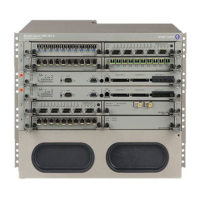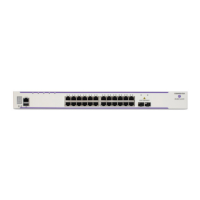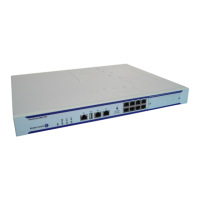IES Service Configuration Commands
Page 724 7750 SR OS Services Guide
If not specified, the system uses the default SRRP gateway MAC address with the last octet
set to the 8 least significant bits of the SRRP instance ID.
keep-alive-interval
Syntax keep-alive-interval interval
no keep-alive-interval
Context config>service>ies>sub-if>grp-if>srrp
Description This command defines the interval between SRRP advertisement messages sent when operating in the
master state. The interval is also the basis for setting the master-down timer used to determine when
the master is no longer sending. The system uses three times the keep-alive interval to set the timer.
Every time an SRRP advertisement is seen that is better then the local priority, the timer is reset. If the
timer expires, the SRRP instance assumes that a master does not exist and initiates the attempt to
become master.
When in backup state, the SRRP instance takes the keep-alive interval of the master as represented in
the masters SRRP advertisement message. Once in master state, the SRRP instance uses its own
configured keep-alive interval.
The keep-alive-interval may be changed at anytime, but will have no effect until the SRRP instance is
in the master state.
The no form of the command restores the default interval.
Parameters interval — Specifies the interval between SRRP advertisement messages sent when operating in the
master state.
Values 1 — 100 hundreds of milli-seconds
Default 1
message-path
Syntax message-path sap-id
no message-path
Context config>service>ies>sub-if>grp-if>srrp
Description This command defines a specific SAP for SRRP in-band messaging. A message-path SAP must be
defined prior to activating the SRRP instance. The defined SAP must exist on the SRRP instances
group IP interface for the command to succeed and cannot currently be associated with any dynamic
or static subscriber hosts. Once a group IP interface SAP has been defined as the transmission path for
SRRP Advertisement messages, it cannot be administratively shutdown, will not support static or
dynamic subscriber hosts and cannot be removed from the group IP interface.
The SRRP instance message-path command may be executed at anytime on the SRRP instance.
Changing the message SAP will fail if a dynamic or static subscriber host is associated with the new
SAP. Once successfully changed, the SRRP instance will immediately disable anti-spoof on the SAP
and start sending SRRP Advertisement messages if the SRRP instance is activated.
Changing the current SRRP message SAP on an active pair of routers should be done in the following
manner:
